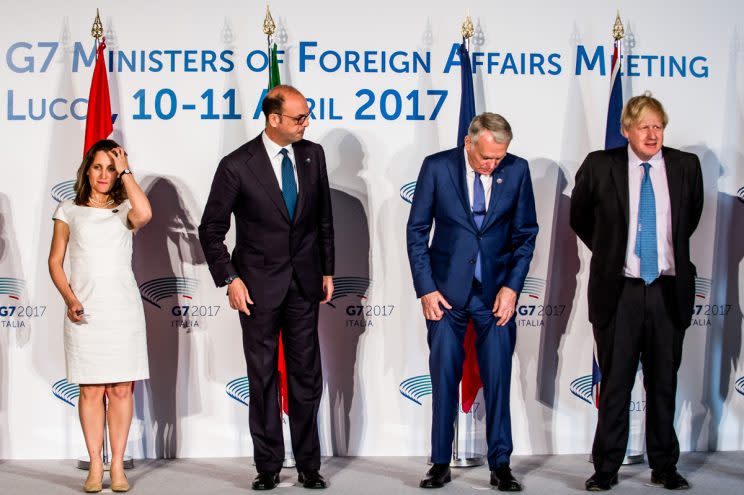Boris Johnson calls for fresh sanctions against Russia: what is the G7?

Boris Johnson, the foreign secretary, has failed in his attempts convince G7 countries to impose new sanctions against Russia over Vladimir Putin’s support for Bashar al-Assad at this week’s summit.
More than 80 people were killed in a chemical attack by the Syrian president’s forces on the rebel-held town of Khan Sheikhoun in north-western of the country last week, prompting international condemnation.
Donald Trump’s retaliation, a cruise missile strike on a Syrian airbase, has provoked anger from Russia and Iran, two of the Syrian president’s allies, who have threatened to use “force” in future.
However, the forum has said it will wait until there is “irrefutable evidence” that the attacks were carried out on al-Assad’s orders.
MORE: Mixed global reaction to Trump’s Syria air strikes
MORE: Is this the end of the Farage/Trump bromance? UKIP MEP slams US President for Syria attack
What is the G7?
The Group of Seven (G7) is an informal bloc of industrialised democracies, which formed in 1975 (then as the Group of Six). This week’s summit, hosted by Italy, is taking place in Lucca, Tuscany in Italy. This meeting is for the foreign leaders, but unlike the United Nations, the G7 is not a formal institution: the presidency rotates annually among member states — they are responsible for setting the agenda. In 2012, the G8 nations comprised 50.1 percent of 2012 global nominal GDP and 40.9 percent of global GDP (PPP). Its influence, which some say is only like to grow, is of great annoyance to the likes of China, which argues it doesn’t have the remit, like the UN, to decide on foreign policy.
Who are the members?
Canada, France, Germany, Italy, Japan, the United Kingdom and the United States of America. Originally, the group was the G6, set up in 1975, but Canada joined a year later. Russia belonged to the forum from 1998 through 2014 — then the Group of Eight (G8) — but was suspended after its annexation of Crimea in March of that year.
Why was it set up?
The forum was set up during the Cold War and provided a venue for non-Communist powers to address economic concerns. At the time, that included inflation and a recession sparked by the OPEC oil embargo.
What’s this year’s version all about?
The hosts, Italy, who set the agenda, want stability in Libya to be key to discussions. However, Syria and – by extension — Russia likely dominated. The US and UK pushed the group to impose new sanctions on the latter, but sources say that Germany and Italy, key players, are only lukewarm on the idea.
“I think the Russians need a way out and a way forward,” Boris Johnson told the BBC in Italy ahead of the talks. “If you think about the position of Vladimir Putin now, he’s toxifying the reputation of Russia by his continuing association with a government which has flagrantly poisoned its own people”.
He called on Moscow to do “everything possible to bring about a political settlement in Syria and work with the rest of the international community to ensure that the shocking events of the last week are never repeated”.

 Yahoo News
Yahoo News 


